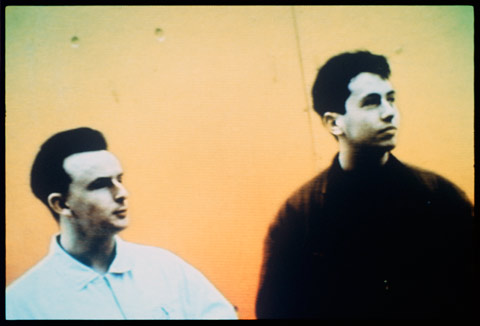Take a peek inside this month’s issue of DJ Magazine and you’ll find my first ever feature for the magazine, an in-depth “Game Changers” article on what I believe to be one of the most influential and timeless British dance records ever made, LFO’s 1990 debut single “LFO”.
Arguably the critical, commercial and artistic high point of the “bleep and bass” techno movement that came out of Yorkshire at the tail end of the ’80s and early ’90s, “LFO” remains one of the most earth-shatteringly bass-heavy records ever to emerge from these shores. Even now, some 28 years after it was first released, the track is capable of causing damage to serious soundsystems.
While it was not the first “bleep” record – though it was inspired, in part, by the first, Unique 3’s “The Theme” – it was undeniably the most successful. It peaked at number 12 in the singles charts, selling well over 120,000 copies, in August 1990. It inspired a swathe of would-be techno producers to make their own sparse, heavyweight “bleep and bass” records and got regular plays in clubs in such far-flung places as Chicago, Detroit, Berlin, Rome and Paris.
I’d also argue – though there wasn’t enough room in the DJ Magazine feature to do this – that “LFO” was one of the purest expressions of the “bleep and bass” blueprint you’ll find. Its’ swinging techno drums were inspired by electro, its’ deep space chord sequence the product of a love of early Detroit techno futurism, and its obsession with ribcage-rattling sub-bass the continuation of a low-end arms race, started by “The Theme”, that reflected the importance of soundsystem culture in Chapeltown, the down-at-heel inner city suburb in which it was recorded.
I won’t say much more as it will spoil the feature. However, I will say that it includes contributions from a man I have got to know very well over the last year, the original (and largely unknown) third member of LFO, Martin Williams AKA DJ Martin. As far as I can make out, this is the first time Martin has spoken on the record about his involvement in the record. Another feature charting his brief (but remarkable) music career as a DJ and producer (and what he does now) will be dropping online in the next few months, so I’ll go into a little more detail then. I’d also like to thank LFO mainstay Gez Varley for sitting down and talking to me at length about the group’s early days and how “LFO” was made. Naturally, you’ll be able to read more about Gez, Martin, the sadly departed Mark Bell and “LFO” in Join The Future: Bleep Techno & The Birth of British Bass Music, when it is published in 2019.

[…] has something to do with it. He is credited as a songwriter on his most famous co-production, LFO’s peerless “LFO”, but by all accounts he was told to fight for that by those around him in Chapeltown, the Leeds […]